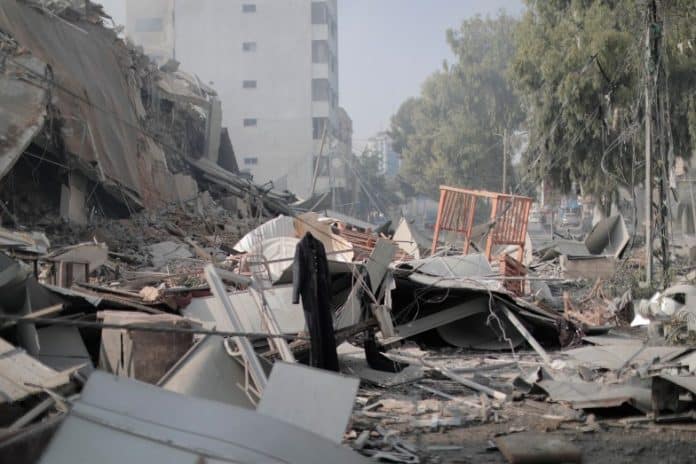The Israeli military operation in Gaza, following the 7 October attacks by Hamas, has become the deadliest and most dangerous conflict for journalists in recent history, say UN experts in a press release.
“We are alarmed at the extraordinarily high numbers of journalists and media workers who have been killed, attacked, injured and detained in the Occupied Palestinian Territory, particularly in Gaza, in recent months blatantly disregarding international law,” the experts said.
“We condemn all killings, threats and attacks on journalists and call on all parties to the conflict to protect them,” they said.
Over 122 journalists killed in Gaza
According to UN reports, since 7 October, more than 122 journalists and media professionals have been killed in Gaza, and many have been injured. Three journalists in Lebanon were killed as a result of Israeli shelling near the border of Lebanon. Four Israeli journalists were killed by Hamas in the 7 October attacks .
Dozens of Palestinian journalists have been detained by Israeli forces in Gaza and the West Bank, where harassment, intimidation and attacks on journalists have increased since the 7 October attacks.
“Rarely have journalists paid such a heavy price for just doing their job as those in Gaza now,” the experts said.
They highlighted the case of Al-Jazeera journalist, Wael al-Dahdouh, who lost his wife, two children and a grandson as a result of Israeli bombing on 25 October 2023, endured a drone attack himself that killed his cameraman in late December and lost another son, also an Al-Jazeera journalist, along with another journalist, killed by Israeli drone strike targeting their car on 7 January 2024.
A “deliberate strategy” against the media
“We have received disturbing reports that, despite being clearly identifiable in jackets and helmets marked “press” or travelling in well-marked press vehicles, journalists have come under attack, which would seem to indicate that the killings, injury, and detention are a deliberate strategy by Israeli forces to obstruct the media and silence critical reporting,” the UN experts said.
“Journalists are entitled to protection as civilians under international humanitarian law. Targeted attacks and killings of journalists are war crimes,” the experts warned.
They expressed grave concern that Israel has refused to let media from outside Gaza enter and report unless they are embedded with the Israeli forces. “The attacks on media in Gaza and restrictions on other journalists from accessing Gaza, combined with severe disruptions of the Internet, are major impediments to the right of information of the people of Gaza as well as the outside world,” the experts said.
Duty to protect journalists
“We urge Israeli authorities to allow journalists to enter Gaza and protect the safety of all journalists in the Occupied Palestinian Territory,” the experts said.
“We further urge the parties to the conflict to allow for and ensure prompt, independent and impartial investigations into every killing of journalists in accordance with international standards, in particular the United Nations Minnesota Protocol on the investigation of potentially unlawful death,” the experts added.
“In closing, we urge the International Court of Justice and the International Criminal Court to give particular attention to the dangerous pattern of attacks and impunity for crimes against journalists, which has intensified since 7 October. Targeting and killing of journalists in the Occupied Palestinian Territory must stop,” they said.
The experts: Ms. Irene Khan, Special Rapporteur on the protection and promotion of freedom of opinion and expression; Ms. Francesca Albanese, Special Rapporteur on the situation of human rights in the Palestinian Territory occupied since 1967; Ms. Mary Lawlor, Special Rapporteur on the situation of human rights defenders; Mr. Morris Tidball-Binz, Special Rapporteur on extrajudicial, summary or arbitrary executions; and Mr. Ben Saul, Special Rapporteur on the promotion and protection of human rights and fundamental freedoms while countering terrorism.




